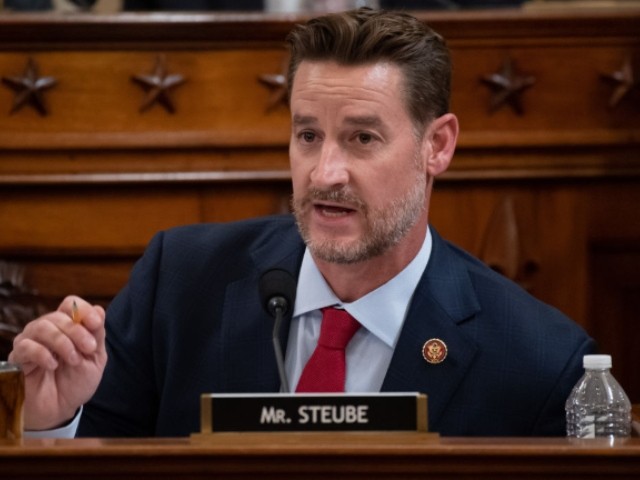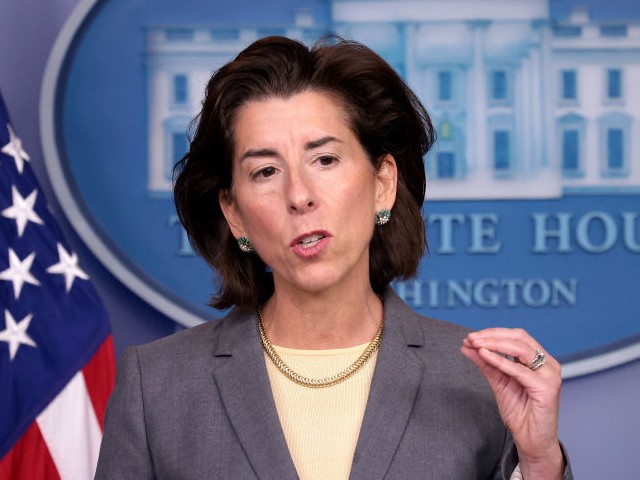House Republicans unveiled legislation on Friday that would prevent sensitive national security technology from falling into the hands of China and other adversaries, Breitbart News has learned exclusively.
Rep. Jim Banks (R-IN), the chairman of the House Republican Study Committee (RSC), along with Reps. Rob Wittman (R-VA) and Greg Steube (R-FL), unveiled the Prioritizing National Security in Export Controls Act of 2022. The legislation would remove export control authority from the Bureau of Industry and Security (BIS), which currently handles export control under the Department of Commerce, and move it to the Defense Technology and Security Administration (DTSA) at the Department of Defense (DOD).
“The Commerce Department would never cut off corporations’ Communist Party cash. National security decisions shouldn’t be left to people who only count in dollars and cents, especially when China is involved,” Banks told Breitbart News in an exclusive statement.
The bill contends that for years the Bureau has been unable to resolve the conflict of interest between “promoting trade and protecting United States national security through enforcing restrictions on technology transfer to high-risk countries, especially China.”

Rep. Robert Wittman (R-VA) speaks during a House Armed Services Committee hearing on Thursday, July 9, 2020, on Capitol Hill in Washington. (Greg Nash/Pool via AP)
In the legislation’s Findings section, Banks, Wittman, and Steube noted that the BIS has approved “almost all requests and has overseen an increase in sales of some particularly important technologies.” They added that there are only 70 Chinese entities on the Commerce Department’s current entity list, which bans technology exports to these entities, despite the fact that “tens of thousands of Chinese entities may meet the United States criteria for military end-user export restrictions.”
“The Bureau of Industry and Security … has not taken a single action since the passing of the Export Control Reform Act of 2018 to restrict foundational technology from being transferred to China,” the bill explained. “In May 2022, the Bureau of Industry and Security dropped foundational technology as a criterion, culminating its defiance of Congress.”

Representative Greg Steube (R-FL) questions witnesses during a House Judiciary Committee hearing on Capitol Hill in Washington, DC, December 4, 2019. (SAUL LOEB/POOL/AFP via Getty Images)
Roslyn Layton — a technology expert who served on the Trump Transition Team for the Federal Communications Commission (FCC) — wrote a column for Forbes noting how many Russian entities ended up on the BIS entity list, but many Chinese organizations got a pass.
Commerce Secretary Gina Raimondo said at a July BIS conference that export controls “are at the red-hot center of how to protect our democracies” and they “matter more than ever.” In response to Russia’s conflict with Ukraine, BIS added 36 Russian parties to the BIS Entity List. However, Layton cautions that China is a greater threat than Russia.
She explained that Secretary Raimondo has had a lax attitude in restricting potentially nefarious Chinese entities:
Many national security experts, including some in the Biden Administration, have called on the Commerce Department to restrict exports to and imports from memory chip maker Yangtze Memory Technologies Corp (YMTC) given its role in supporting China’s military ambitions. The company is on a buying spree of U.S. chipmaking equipment, stockpiling machines for which its pays more than competitors. Reportedly Secretary Raimondo and National Security Advisor Jake Sullivan met with executives from leading US companies Lam Research, KLA, and Applied Materials to probe their record profits in China and whether they give preferential sales treatment to Chinese fabs over orders from Intel, TSMC, and Samsung. Raimondo concluded that the sales themselves were not problematic and that the U.S. government should not micromanage them.
Layton cited Derek Scissors of the American Enterprise Institute (AEI), who said that the Commerce Department has focused on aiding commerce over national security.
“The true reason Commerce is dead set against restricting foundational technology is American companies make a good deal of money selling products utilizing foundational technology to China,” Scissors said.
An August Wall Street Journal report found that nearly all export requests to China are approved:
A Commerce Department-led process that reviews U.S. tech exports to China approves almost all requests and has overseen an increase in sales of some particularly important technologies, according to an analysis of trade data.Of the U.S.’s total $125 billion in exports to China in 2020, officials required a license for less than half a percent, Commerce Department data shows. Of that fraction, the agency approved 94%, or 2,652, applications for technology exports to China, the analysis showed.
Raimondo’s refusal to rein in the export of sensitive technologies to China raises questions about her family’s ties to China.

U.S. Secretary of Commerce Gina Raimondo speaks during the daily White House briefing November 9, 2021, in Washington, DC. (Win McNamee/Getty Images)
Raimondo’s husband, Andy Moffit, reportedly has furthered his financial investment in PathAI, an artificial intelligence business that is backed by a company with strong ties to the Chinese Communist Party (CCP).
To alleviate this seeming conflict of interest between corporate profit and national security, the Republicans’ bill would move the export control authority from the BIS to the Defense Technology Security Administration at DOD. While there may not be an ideal bureaucracy to handle this national security issue, it appears that BIS is not up to the task.
However, Steube, Banks, and Wittman believe that the DTSA could better counter China’s acquisition of sensitive national security technologies.
“BIS has failed to prevent U.S. technology transfers to high-risk countries, like China. Moving export control authority to the DoD is an important step in prioritizing our national security and countering the threat of China,” Steube explained in an exclusive statement to Breitbart News.
Sean Moran is a congressional reporter for Breitbart News. Follow him on Twitter @SeanMoran3.

COMMENTS
Please let us know if you're having issues with commenting.